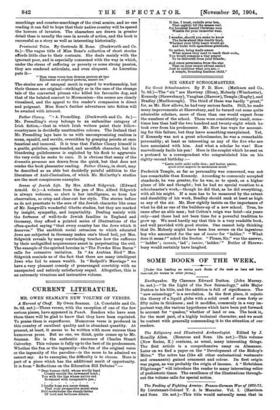Six Great Schoolmasters. By F. D. How. (Methuen and Co.
7s. 6d.)—The " six " are Hawtrey (Eton), Moberly (Winchester),. Kennedy (Shrewsbury), Vaughan (Harrow), Temple (Rugby), and Bradley (Marlborough). The third of these was hardly " great," for, as Mr. How allows, he had very serious faults. Still, he made many improvements at Shrewsbury, and he turned out some quite- admirable scholars, more of them than one would expect from- the numbers of the school. These were consistently small, some- times less than half the two hundred and twenty-eight which he took over from his predecessor. Mr. How has ways for account- ing for this failure, but they leave something unexplained. Yet, if Kennedy was not a great schoolmaster, he was a remarkable personality ; at least as interesting as any of the five who are- here associated with him. And what a scholar he was ! How marvelously facile his pen! Here is the couplet which he sent on a postcard to a correspondent who congratulated him on his- eighty-second birthday pieta redit mihi nulla dies ; sad laetor, amice, quod iuvat aegroti to meminisse senis."
Frederick Temple, as far as personality was concerned, was not less remarkable than Kennedy. According to commonly accepted' standards, he was greater, for he was, so to speak, on a higher plane of life and thought ; but he had no special vocation to a schoolmaster's work,—though he did that, as be did everything,. with all his might. If a man has to be measured by the extent and durability of his work, Bradley should rank at least as high, as any of the six. Mr. How rightly insists on the importance of what he did as one of the builders-up of a new school. True, be- came after an able man ; but Cotton's reign was brief—six years only—and there had not been time for a powerful tradition to- grow up. We need hardly say that this is a very readable book, and well provided with good stories. One cannot help thinking that Dr. Moberly might have been less severe on the ingenious. boy who accounted for the use of iunior for "ladder." " What does it mean ?" asked the Doctor. " Please, Sir," was the answer,. " ' ladder' ; iuvenis, lad' ; iunior, 'ladder.'" Butler of Shrews- bury would certainly have laughed.














































 Previous page
Previous page